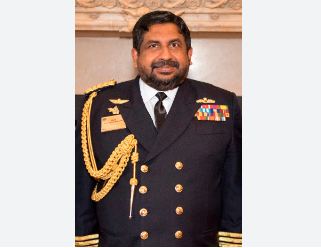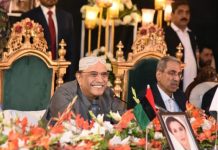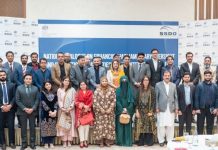Agencies
ISLAMABAD, In the evolving landscape of South Asian diplomacy, Sri Lanka’s High Commissioner to Pakistan, Admiral (R) Ravindra C Wijegunaratne has stressed for collaborative efforts to address regional challenges and foster economic integration.
The envoy offering a compelling vision for the future of Sri Lanka-Pakistan relations, underscored a partnership poised to shape the strategic dynamics of the region. As both nations navigate shared interests in trade, defense, and cultural exchange, their mutual commitment to sustainable development and mutual prosperity stands as a testament to enduring diplomatic camaraderie.
Highlighting Pakistan’s pivotal economic developments linked to CPEC and the operationalization of Gwadar Port, he expressed his country’s commitment to furthering diplomatic, economic and cultural ties with Pakistan.
He also stressed the importance of long-term policies focusing on youth development, agriculture, and water security for sustained growth.He emphasized the necessity for Pakistan to formulate long-term policies that prioritize youth development, agricultural sustainability, and enhanced water security to sustain economic growth effectively.
Regarding bilateral ties, the envoy reiterated Sri Lanka’s commitment to strengthening relations with Pakistan across multiple fronts, including trade, tourism, and defense. He pointed out Sri Lanka’s pivotal role as an international transshipment hub, particularly for mega-container ships like the Triple E-Class, which cannot dock at all ports due to their size. He anticipated that the full operationalization of Gwadar Port would provide Pakistan with significant revenue opportunities, particularly for transit trade to Central Asian Republics (CARs).
Reflecting on the historical camaraderie between the two nations, Admiral Wijegunaratne recalled Sri Lanka’s steadfast support for Pakistan during critical junctures, including providing crucial logistical support during the 1971 war. He praised Pakistan’s assistance in combating insurgency in Sri Lanka, highlighting the provision of military hardware that helped in defeating the Tamil Tigers.
Economically, he noted the bilateral trade volume of approximately one billion dollars annually, with prospects to exceed this mark, emphasizing Pakistan’s exports to Sri Lanka and Sri Lanka’s potential to expand its exports to Pakistan. He also discussed Sri Lanka’s interest in boosting tourism between the two countries, noting challenges in air connectivity that hinder potential growth in this sector.
On educational and cultural exchanges, Admiral Wijegunaratne highlighted initiatives such as the Allama Iqbal Scholarship, which supports Sri Lankan students studying in Pakistan. He mentioned Sri Lanka’s eagerness to collaborate with Pakistan in religious education and praised Pakistan’s hosting of the Gandhara Culture Symposium, emphasizing the cultural ties that could enhance tourism and mutual understanding.
Looking ahead, Wijegunaratne discussed Sri Lanka’s recovery from economic challenges exacerbated by COVID-19, focusing on revitalizing tourism and improving agricultural productivity. He suggested Pakistan negotiate debt restructuring with international lenders and leverage its diaspora to bolster foreign exchange reserves.
Addressing regional challenges, he highlighted climate change as a potent threat to South Asia, stressing the need for collective action. He praised Pakistan’s efforts in addressing water security issues and emphasized the importance of environmental sustainability.
In conclusion, Admiral Wijegunaratne expressed optimism about the future of Pakistan-Sri Lanka relations, envisioning deeper economic integration and enhanced cooperation in regional and global forums. He emphasized the mutual benefits of strategic partnerships and reaffirmed Sri Lanka’s commitment to furthering diplomatic, economic, and cultural ties with Pakistan.
Sri Lanka, strategically situated in the Indian Ocean, boasts a diverse economy driven by agriculture, tourism, and emerging sectors like IT and finance. Despite historical challenges, the country has achieved stability and is governed as a democratic republic. Known for its rich cultural heritage and biodiversity, Sri Lanka attracts visitors and investors alike, offering a promising outlook in South Asia.

















